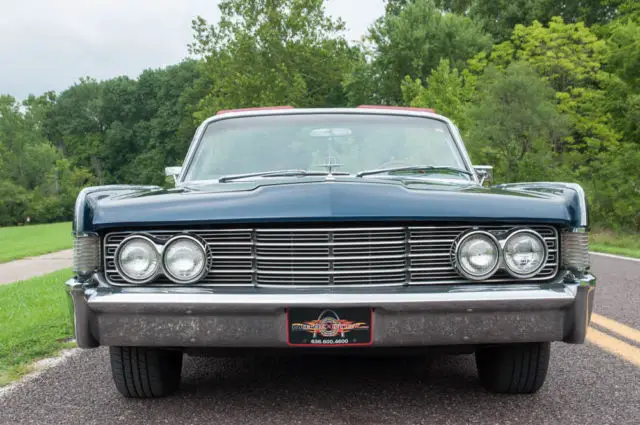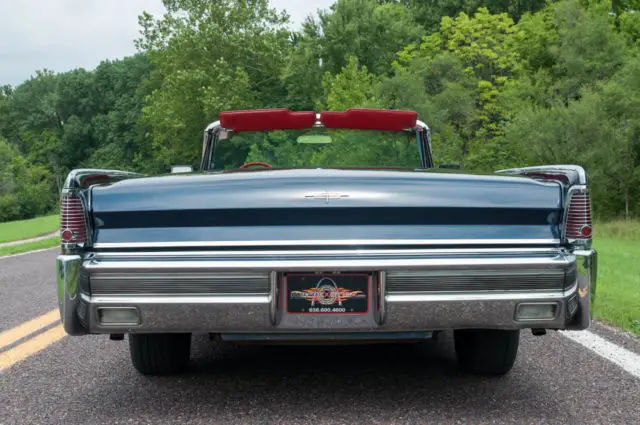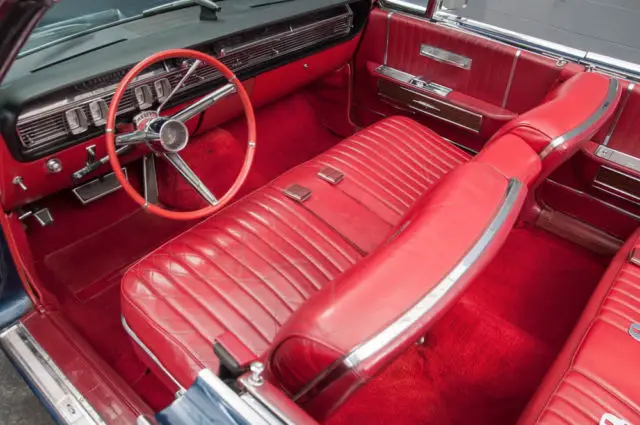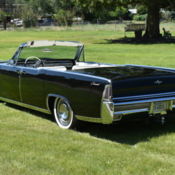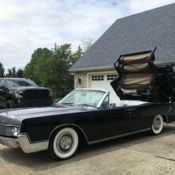1965 Lincoln Continental Four-Door Convertible, Nocturne Blue, Red Leather, NICE
| Make: | Lincoln |
| Model: | Continental |
| SubModel: | Continental Four-Door Convertible |
| Type: | Convertible |
| Trim: | Continental Four-Door Convertible |
| Year: | 1965 |
| Mileage: | 90,375 |
| VIN: | 5Y86N416884 |
| Color: | Nocturne Blue |
| Engine: | 430 V8 |
| Cylinders: | 8 |
| Transmission: | Automatic |
| Drive type: | RWD |
| Interior color: | Red Leather |
| Vehicle Title: | Clear |
| Item location: | Saint Louis, Missouri, United States |
| Extras |
| Listed by | Private seller |
Description of 1965 Lincoln Continental Continental Four-Door Convertible |
|
1965 Lincoln Continental Four-Door Convertible Description 1965 Lincoln Continental Four-Door Convertible Same family ownership for past 18 years (dad 10, son eight) One of 40,180 Continentals made in 1965 Mercury-Edsel-Lincoln (MEL) 430 CID V-8 (N-code) engine (320 hp); 1965 was the final model year for this engine Three-speed Turbo-Drive automatic transmission Nocturne Blue (trim code H) exterior with contrasting, original red leather interior Power steering, power brakes with discs in front, six-way power front seat, power locks, power windows, power antenna, automatic parking brake release, automatic headlamp dimmer and power top, air-conditioning and cruise control Rear-hinged, rear “suicide” doors Front-hinged hood Factory AM/FM stereoAmerica’s only four-door convertible was uniquely Continental. MotoeXotica is proud to offer this 1965 Lincoln Continental Four-Door Convertible that has been in the same family for the last 18 years. It combined the interior space and comfort of the four-door sedan with the easy of a completely automatic convertible and the luxury of an open town car. Beginning in 1961, the Continental returned to the Lincoln model lineup for the first time since 1948. This example was made in Ford’s Wixom, Michigan plant on December 5, 1964 and it was designated for sale in the Dallas, Texas region. Finished in Nocturne Blue (H code) exterior with original contrasting red leather interior, this car has a low, wide presence that commands attention wherever it goes. Besides its overall glossy coat of paint, it features very good glass parts, intact and clear. Some of the paint and trim exhibit minor blemishes upon close inspection but the headlights and taillights are in good shape, all of the body panels are laser straight and in overall good shape. The windshield wipers are set to sweep the glass in the opposite direction from most North American vehicles. Inside, there is an original red leather interior from Bridge of Weir in Scotland, which has furnished Ford leather interiors since 1911, beginning with the first Model Ts sold in the U.K. The front bench and rear bench seats and the doorskins are in great condition, considering their age. The carpet is likewise in good shape. This car had the largest rear passenger compartment of any vehicle made. The factory air-conditioning runs but does not blow cold air and the speedometer and battery gauge needles jump but the dashboard is free of cracks and is period correct. The three-spoke steering wheel and silver column gearshift lever are in fine shape. Car features a factory AM/FM stereo. Driver assist features include automatic parking brake release, cruise control, power and tilt steering, power brakes with discs in front, power windows, power locks, power antenna, remote control driver’s sideview mirror and six-way power front seat. Nineteen sixty-five marked the introduction of by-pass switch on the master control panel that allowed all of the windows, even the side vents to be operated without using the ignition key. Most recently owned by a Mr. LaMore of St. Louis, Missouri, who acquired the car in April of 2008 from the father who owned the car for 10 years prior, he had the following work done to the car – in October 2012, he had the crankshaft balancer replaced and pulley with alternator belts; in August of 2012, he had the battery replaced, oil and filter changed, brake system flushed, adjusted ignition timing and install vacuum advance, replaced speedometer cable from factory cruise control to transmission, fuel pump and master cylinder, in July of 2013, an oil and filter change was done; in August of 2013, the brake light switch was replaced; in September of 2015, an oil and filter change and a cooling system flush performed. Under the big hood, which is hinged at the front, lies a 430 CID V-8 (N-code), with a four-barrel Carter carburetor, making 320 horsepower and with a 10.1:1 compression ratio and mated to a three-speed Turbo-Drive automatic transmission. The 430 CID engine was produced from 1958 through 1965. It was the standard engine on all 1958 to 1960 Lincolns and Continentals. Horsepower was 375 in 1958, 350 in 1959, 315 in 1960, 325 in 1961 and 340 in 1964. It was commonly referred to as the “Bulldozer” of the MEL series engines. The engine bay is clean and the battery is in good shape. The car rolls on newer Dimension IV all-season radial tires wrapped around Lincoln factory steelies topped with factory hubcaps. The most recognized design feature of the Continental was the return of rear-hinged “suicide doors,” last seen on the 1951 Lincolns. The decision to reintroduce rear-hinged doors was based on the interest of preserving rear-seat access. In styling mock-ups, Ford engineers had trouble exiting the rear seat without hitting the rear doors with their feet so the decision was made to hinge the doors from the rear to solve the issue. The “suicide doors”, were a purely practical decision, reusing a feature offered on the 1950 Lincoln Lido, the Lincoln-Zephyr sedan of the 1940s and all Mercury Eight sedans in 1939. In the interest of safety, these Continentals featured a “Door Ajar” warning light on the dash. To streamline production, all Lincoln Continentals were four-doors sedans or convertibles while sedans featured a thin “B” pillar; the design allowed for the use of frameless door glass. This so-called “slab-side” design ran from 1961 to 1969 with few changes from year to year. Lincoln dealers began to find that many people who bought 1961 and post-1961 models were keeping their cars longer. Starting in 1961, Continentals came with a factory two-year/24,000-mile bumper-to-bumper warranty. For 1965, the Continental received several more updates. The pointed, convex grilles seen since introduction in 1961 were replaced by a flat, blunt grille. To match the brake lights/turn signals, the front parking lamps/turn signals were moved out of the front bumper, wrapping into the fender; both lenses had ribbed chrome trim. Front disc brakes became standard to improve the 5,000-pound Continental’s braking; in addition, front seat belts with retractors became standard. To improve reliability, Lincoln added an oil pressure gauge. With the facelift, sales improved about 10 percent, to 40,180 units. Serving as the Lincoln flagship for its first three generations, the Continental name conveyed special cachet in the product line. In the 1961 redesign of Lincoln, the three-model line was consolidated to the Continental, which served as the sole Lincoln sedan for the next 16 years. With the exception of the Lincoln Mark VIII, all versions of the Lincoln Mark Series personal luxury cars are based on a corresponding generation of the Continental. Current mileage on the odometer shows 90,375 miles. It is sold as is where is on a clean and clear, mileage exempt title. GET OUT AND DRIVE!!! VIN: 5Y86N416884 Note: Please see full terms and conditions listed below that pertain to the purchase of any said vehicle, thank you. |
 Home
Home Contact us
Contact us NEWEST CARS
NEWEST CARS SELL YOUR CAR
SELL YOUR CAR FAQ
FAQ
